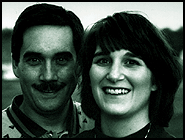Just Business or Just Friends?
IN THE SMALL TOWN OF LEBANON, PENNSYLVANIA 27-year-old Carla carried and delivered a baby last year for an Australian couple. Carla and her husband are both medical technicians and have two young daughters of their own. Carla's surrogate pregnancy and delivery were difficult - which had not been the case with her own babies. But she remains cheerful about the experience.

|
|
Corey and Carla of Lebanon, Pennsylvania. Last year Carla carried a baby for an infertile Australian couple.
|
"This is something I felt I had to do. I just wanted to help someone out. Everyone deserves a child, and this is something I could do for someone else," Carla says.
Carla, a gestational surrogate from Pennsylvania, explains how the easy, uncomplicated pregnancies with her own daughters got her thinking about carrying babies for those who cannot.
LISTEN
As it turned out, Carla and Corey became good friends with the Australians, who flew over for the conception and then returned for the birth. The couple stayed with Carla and Corey for two weeks waiting for their baby to come.
"When the baby came out, it was really weird," Corey says. "We didn't have a bond or a connection to him at all. It was more with the Australian parents than anything."
Carla nods in agreement. She says there was no feeling of loss when the baby left. "It was like I was baby sitting. He was a visitor. It wasn't like an emotional connection," Carla says. Meanwhile, the two couples stay in touch from their opposite sides of the globe.
Psychologists who work with surrogates say the relationship formed among the adults often determines how a gestational carrier will feel about the experience afterwards. Researcher and health policy expert Nancy Reame of the University of Michigan is conducting a long-range study of surrogates. If the intended parents treat the surrogate with respect and concern, Reame says, the surrogate appears to experience much less sense of loss after the baby is gone. Many surrogate mothers want some form of ongoing contact with the families they help, she says.
"Sometimes there is an artificial friendship created by the [intended] couple during the pregnancy to keep the carrier happy, and they abandon her once the child is in their custody," Reame says. "It can leave the carriers bitter and sad, but very few have said they regretted the experience."
Next:
Justy Delivers
Surrogate Motherhood home
| 
